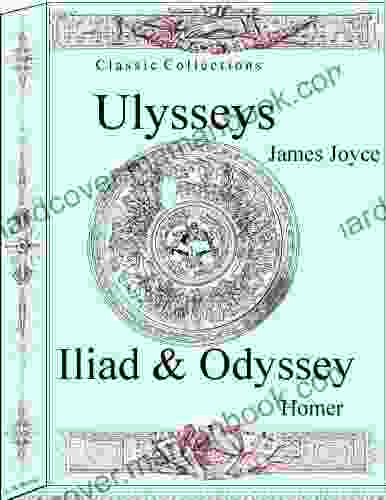Ulysses by James Joyce, The Iliad and The Odyssey by Homer: A Literary Odyssey into Ancient and Modern Masterpieces

James Joyce's Ulysses and Homer's The Iliad and The Odyssey are two of the most celebrated and influential works of literature in the Western canon. Both works grapple with profound themes of human existence, but they do so in vastly different ways. Ulysses is a modernist masterpiece that employs stream-of-consciousness narration and a dizzying array of literary techniques to tell the story of a single day in Dublin. The Iliad and The Odyssey, on the other hand, are epic poems that recount the Trojan War and the subsequent journey of Odysseus back to his home in Ithaca. Despite their differences, these three works share a common thread: they are all essential reading for anyone interested in understanding the human condition.
5 out of 5
| Language | : | English |
| File size | : | 6383 KB |
| Text-to-Speech | : | Enabled |
| Screen Reader | : | Supported |
| Enhanced typesetting | : | Enabled |
| Word Wise | : | Enabled |
| Print length | : | 3103 pages |
| Lending | : | Enabled |
Ulysses: A Modernist Masterpiece
James Joyce's Ulysses is a landmark work of modernist literature. Published in 1922, it is considered one of the most important and influential novels of the 20th century. The novel tells the story of Leopold Bloom, a Jewish advertising salesman who wanders around Dublin on a single day in June 1904. Bloom's journey is loosely based on the wanderings of Odysseus in Homer's The Odyssey. However, Joyce's novel is much more than a simple retelling of the ancient epic. It is a complex and challenging work that explores the inner lives of its characters and the nature of modern society.
One of the most striking things about Ulysses is its use of stream-of-consciousness narration. This technique allows the reader to experience the thoughts and feelings of the characters directly. As a result, the novel is full of rich and complex insights into the human condition. However, it can also be a difficult read, as the reader must constantly work to keep up with the characters' rapidly shifting thoughts.
In addition to its stream-of-consciousness narration, Ulysses is also known for its use of literary techniques such as parody, satire, and symbolism. Joyce uses these techniques to create a rich and textured world that is both familiar and strange. Ulysses is a challenging and rewarding novel that offers a unique and unforgettable reading experience.
The Iliad and The Odyssey: Epic Poems of Ancient Greece
Homer's The Iliad and The Odyssey are two of the most important works of literature in Western civilization. These epic poems tell the story of the Trojan War and the subsequent journey of Odysseus back to his home in Ithaca. The Iliad focuses on the events of the Trojan War, while the Odyssey tells the story of Odysseus's ten-year journey home. Both poems are full of adventure, drama, and suspense, and they offer a fascinating glimpse into the world of ancient Greece.
The Iliad is the shorter of the two poems, and it tells the story of the Trojan War. The poem begins with the abduction of Helen, the wife of Menelaus, by the Trojan prince Paris. The Greeks launch a massive expedition to retrieve Helen, and the war rages for ten years. The Iliad focuses on the events of the final year of the war, and it culminates in the death of the Trojan hero Hector.
The Odyssey is a longer and more complex poem than the Iliad. It tells the story of Odysseus's ten-year journey home after the Trojan War. Odysseus faces many challenges on his journey, including storms, monsters, and sirens. However, he eventually returns home to Ithaca, where he is reunited with his wife, Penelope, and his son, Telemachus.
The Iliad and The Odyssey are essential reading for anyone interested in understanding the Western literary tradition. These poems are full of adventure, drama, and suspense, and they offer a fascinating glimpse into the world of ancient Greece.
A Literary Odyssey: Exploring Ulysses, The Iliad, and The Odyssey
James Joyce's Ulysses, Homer's The Iliad, and Homer's The Odyssey are three of the most important works of literature in the Western canon. These works explore profound themes of human existence, and they do so in vastly different ways. Ulysses is a modernist masterpiece that employs stream-of-consciousness narration and a dizzying array of literary techniques to tell the story of a single day in Dublin. The Iliad and The Odyssey, on the other hand, are epic poems that recount the Trojan War and the subsequent journey of Odysseus back to his home in Ithaca. Despite their differences, these three works share a common thread: they are all essential reading for anyone interested in understanding the human condition.
Reading Ulysses, The Iliad, and The Odyssey is a literary odyssey that will take you on a journey through time and space. You will experience the sights and sounds of ancient Greece, the bustling streets of Dublin, and the inner lives of some of the most complex characters in literature. Along the way, you will learn about the human condition and the nature of existence. It is a journey that is well worth taking.
Additional Resources
- The Iliad
- The Odyssey
- Ulysses
- Ulysses at 100
- The Classics Reborn
5 out of 5
| Language | : | English |
| File size | : | 6383 KB |
| Text-to-Speech | : | Enabled |
| Screen Reader | : | Supported |
| Enhanced typesetting | : | Enabled |
| Word Wise | : | Enabled |
| Print length | : | 3103 pages |
| Lending | : | Enabled |
Do you want to contribute by writing guest posts on this blog?
Please contact us and send us a resume of previous articles that you have written.
 Top Book
Top Book Novel
Novel Fiction
Fiction Nonfiction
Nonfiction Literature
Literature Paperback
Paperback Hardcover
Hardcover E-book
E-book Audiobook
Audiobook Bestseller
Bestseller Classic
Classic Mystery
Mystery Thriller
Thriller Romance
Romance Fantasy
Fantasy Science Fiction
Science Fiction Biography
Biography Memoir
Memoir Autobiography
Autobiography Poetry
Poetry Drama
Drama Historical Fiction
Historical Fiction Self-help
Self-help Young Adult
Young Adult Childrens Books
Childrens Books Graphic Novel
Graphic Novel Anthology
Anthology Series
Series Encyclopedia
Encyclopedia Reference
Reference Guidebook
Guidebook Textbook
Textbook Workbook
Workbook Journal
Journal Diary
Diary Manuscript
Manuscript Folio
Folio Pulp Fiction
Pulp Fiction Short Stories
Short Stories Fairy Tales
Fairy Tales Fables
Fables Mythology
Mythology Philosophy
Philosophy Religion
Religion Spirituality
Spirituality Essays
Essays Critique
Critique Commentary
Commentary Glossary
Glossary Bibliography
Bibliography Index
Index Table of Contents
Table of Contents Preface
Preface Introduction
Introduction Foreword
Foreword Afterword
Afterword Appendices
Appendices Annotations
Annotations Footnotes
Footnotes Epilogue
Epilogue Prologue
Prologue Jon Krakauer
Jon Krakauer Rob Gifford
Rob Gifford Ella S Kitchen
Ella S Kitchen Revised Edition Kindle Edition
Revised Edition Kindle Edition Sally Augustin
Sally Augustin Eduardo De Filippo
Eduardo De Filippo Stephen Crane
Stephen Crane Don K Philpot
Don K Philpot Natalie Solomon
Natalie Solomon Cecilyn Cayetano Hutchinson
Cecilyn Cayetano Hutchinson Madeleine L Engle
Madeleine L Engle K G Lewis
K G Lewis Douglas W Tallamy
Douglas W Tallamy Michael R G Spiller
Michael R G Spiller Christina Wu
Christina Wu Bobbi Conner
Bobbi Conner Chris Portie
Chris Portie Paul Vidich
Paul Vidich Nick Dang
Nick Dang Michael Ford
Michael Ford
Light bulbAdvertise smarter! Our strategic ad space ensures maximum exposure. Reserve your spot today!
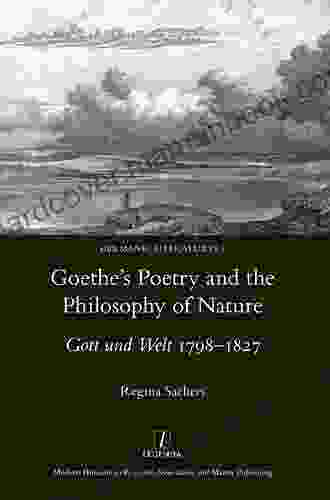
 Derrick HughesGoethe's Poetry and the Philosophy of Nature: A Journey Through the Sublime...
Derrick HughesGoethe's Poetry and the Philosophy of Nature: A Journey Through the Sublime...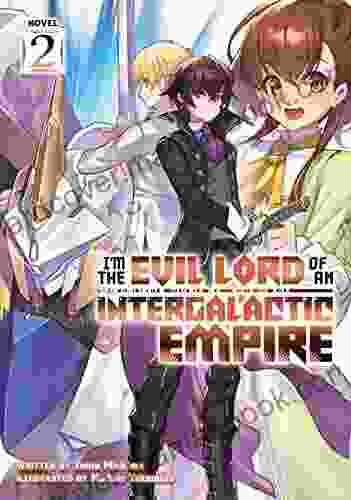
 Connor MitchellUnveiling the Intriguing World of The Evil Lord of an Intergalactic Empire:...
Connor MitchellUnveiling the Intriguing World of The Evil Lord of an Intergalactic Empire:...
 Natsume SōsekiThis Will Transform Your Life: Learn How to Make Money from Home with Very...
Natsume SōsekiThis Will Transform Your Life: Learn How to Make Money from Home with Very... Glenn HayesFollow ·18.5k
Glenn HayesFollow ·18.5k Vernon BlairFollow ·18.9k
Vernon BlairFollow ·18.9k Trevor BellFollow ·11.9k
Trevor BellFollow ·11.9k Arthur Conan DoyleFollow ·16.3k
Arthur Conan DoyleFollow ·16.3k Isaiah PowellFollow ·16.9k
Isaiah PowellFollow ·16.9k Mike HayesFollow ·9.8k
Mike HayesFollow ·9.8k Rod WardFollow ·5k
Rod WardFollow ·5k Colin RichardsonFollow ·11.2k
Colin RichardsonFollow ·11.2k

 Eugene Powell
Eugene PowellComplete Guide to Using Yoga With Kids: Benefits, Tips,...
Yoga is an ancient practice that has been...
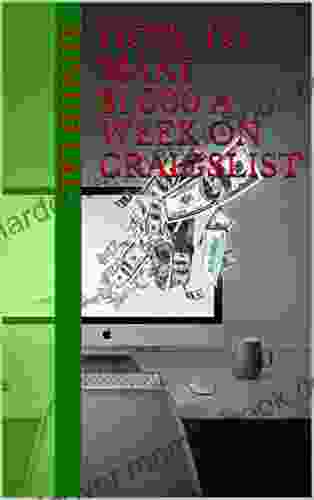
 Benji Powell
Benji PowellHow to Make $000 Per Week on Craigslist
Are you looking for a way to make extra money...

 Gabriel Garcia Marquez
Gabriel Garcia MarquezGrocery Row Gardening: The Exciting New Permaculture...
Kick-start your gardening journey with the...
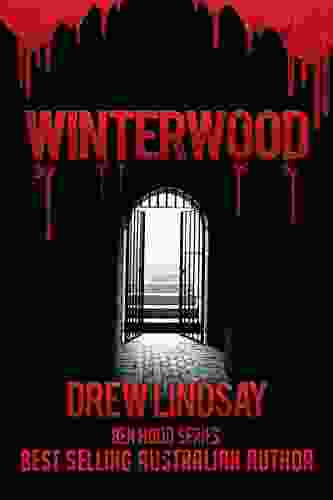
 Hayden Mitchell
Hayden MitchellUnveiling the Gripping World of Winterwood: Ben Hood...
In the annals of crime thrillers, the...

 E.M. Forster
E.M. ForsterThe Financial Advisor Guide To Managing and Investing...
As a financial...
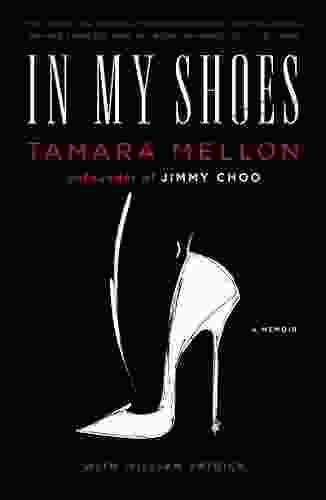
 Lee Simmons
Lee SimmonsIn My Shoes Memoir: A Poignant Journey of Resilience,...
In the tapestry of life, adversity often...
5 out of 5
| Language | : | English |
| File size | : | 6383 KB |
| Text-to-Speech | : | Enabled |
| Screen Reader | : | Supported |
| Enhanced typesetting | : | Enabled |
| Word Wise | : | Enabled |
| Print length | : | 3103 pages |
| Lending | : | Enabled |


